study programmes
Who do you want to be?


Everything digital had to be programmed by someone. The next million-dollar app, social network, e-shop or artificial intelligence can be created by you. We’ll teach you.
- You will be able to design algorithms, program them and analyse their complexity. You will learn to work with technologies such as C, C++, Java, Python, HTML5, PHP, and Javascript.
- You’ll learn the basics of artificial intelligence, the principles of object-oriented programming, the details of computer architecture, and how operating systems work.
- We will teach you how to collect, process and transfer data or exchange data on the Internet (XML, JSON). You will understand how to manipulate data using databases, including the use of SQL servers and clients.
- You will learn about information and communication networks, as well as the creation of models and simulations.
- You will understand the use of integration middleware, including the use of application and web servers such as Apache and Tomcat.
- You will learn to solve and present projects independently.
- You can choose a career as a consultant, analyst, system designer, developer or IT specialist. Most often we see graduates coding websites and apps, then in technology companies as IT security specialists or IT architects or starting their own technology startups.
- But today, no company can do without an information system, a cloud solution or a clever cyber securist – you’ll have no shortage of applications. You will be welcomed with open arms in IT companies, consulting firms, schools, scientific and research institutions.
- Or you have the option to go on to further engineering studies.
Tesla autonomous electric car, space rover, drone, personal assistant connected to the Internet of Things, intelligently controlled production line. What do they have in common? They are all mechatronic devices!
- Information and action-oriented knowledge drive today’s digital world. How can it all be managed? We offer you the field where it can be done. Mechatronics combines computer science, electronic systems, automation and mechanics using intelligent technologies.
- Are you interested in the use of digital technologies and automated control? Would you like to program your own smart device endowed with artificial intelligence, visualize it in virtual reality or present it in a metaverse? Follow the path of the modern study programme “Intelligent Technologies and Systems”.
- Want to know how hybrids and electric cars work? Have autonomous vehicles and transport appealed to you? If you are interested in cars, the digitalization of their production or hydrogen technology, then the focus “Automotive Mechatronics and Electromobility” is just for you.
- Our flexible curriculum offers an unrivalled choice of subjects. Once you’ve mastered the basics, you’ll choose what you enjoy from our wide range of courses. Later, as you grow professionally, you can narrow your focus and specialise and choose a profession to suit you. Your knowledge of the broad field of mechatronics predisposes you to become a team leader or innovation project manager.
- You will be in demand in areas where hardware and software are combined. You will use your skills in programming and developing smart devices based on modern electronics and advanced software technologies.
- You can work as a designer and architect of mechanical components using state-of-the-art prototyping, simulation tools and digital twins.
- You’ll be part of the industrial revolutions of the 21st century called Industry 4.0 and 5.0. Thanks to you, production in smart digital factories will support efficient collaboration between man and machine. This will ensure long-term sustainable and environmentally friendly production.
- You will become an architect of automotive safety systems and a developer in the field of autonomous vehicles and machine vision. You’ll understand the latest trends in electromobility and hydrogen technologies.
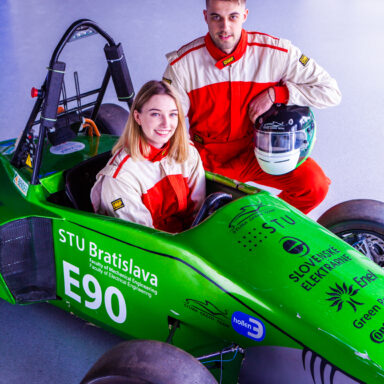
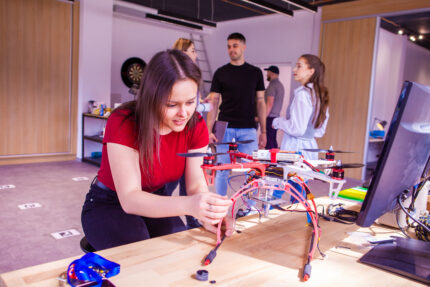
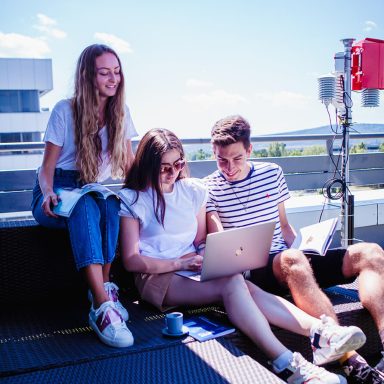
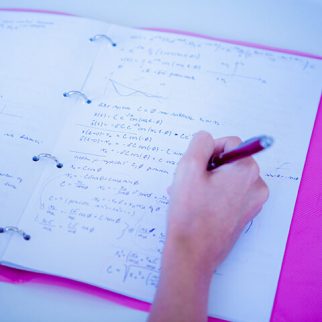
We know how to get electricity from the sun, wind or water to the socket and how to use it to charge your mobile phone. If you’re fascinated by the fact that a lemon can light up a light bulb, you’re one of us.
- How to generate, transmit, distribute and use electricity efficiently. You’ll know how to design, build and operate efficient electricity equipment and systems.
- You will gain knowledge of lighting technology and will also be involved in low- and high-voltage equipment technology. You will learn about the principle and operation of electrical machines, drives and power electronics.
- Our graduates are employed in all sectors of the power industry – from power distribution system designers, specialists and power systems analysts to managers in established power companies.
- Or you can go on to study for an engineering degree.
Discover the world of microprocessors, their programming, integrated circuit design and the endless possibilities of their applications. Dive into the micro and nanocosm of semiconductors, computer simulations and the use of AI for modelling. If you’re curious about what powers electric cars, this is where you’ll find yourself!
- Design, construct and apply electronic circuits and systems in a wide variety of electronics, photonics and electronic communications fields.
- You will learn to work with audio-video, radio, optical and bio signals. Terms such as nanoelectronics, integrated circuits, power electronics, smart sensors, organic electronics or optoelectronics will no longer be foreign words to you.
- You’ll know how to use and explore Internet of Things (IoT) systems.
- You’ll be an expert in electronics and electronic systems in a variety of industries, but you won’t be lost in computer science or automation, in short, anywhere electronics are used.
- You’ll be able to get a job in science and research not only in Slovakia, but all over Europe and the world.
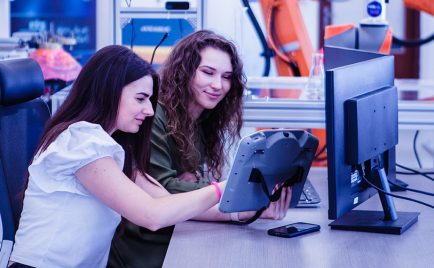
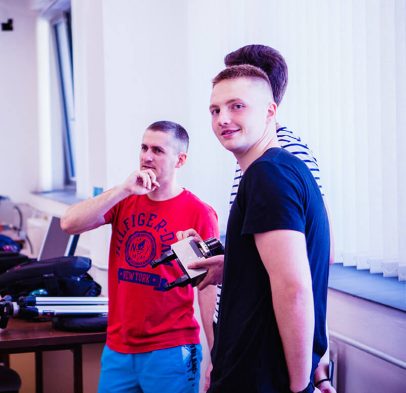
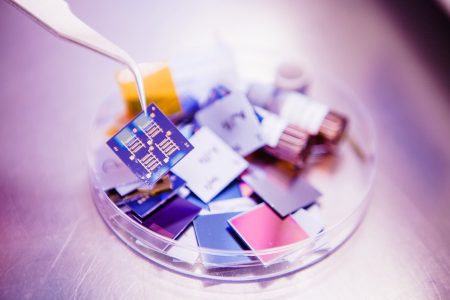
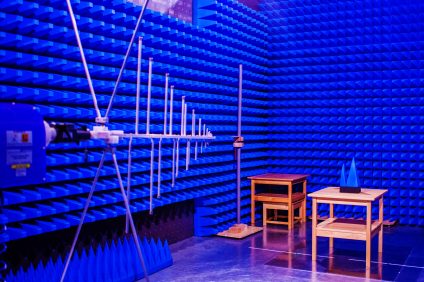
If we were on the Big Bang Theory, we’re Howard. In short, we understand the theory and we’re not afraid to get our hands dirty with the practice. We connect wires and see electrons flowing through them.
- During your studies, you will gain knowledge of various digital and analog circuits, electromagnetic fields as well as the basics of programming. You will learn how to work in many professional simulation and design programs and gain practical experience with advanced measuring instruments.
- Through electives, term papers and theses, you determine the area in which you want to develop yourself.
- Electrical system designers, developers or testers. You will be in demand in industries related to electrical, electronics and circuit engineering, or in related fields such as IT.
- By completing the Bachelor’s degree you will gain a solid foundation for further engineering studies in Applied Electrical Engineering.
Voicemails, FaceTimes, Directy. Sound, picture and text. How to record them, send them on and run them again? Everything is data, and in this class you’ll learn how to control it.
- Design, construct and operate information and communication systems and networks. Are you interested in the Internet of Things, 5G+ networks, optical communications or the Metaverse? Get into it! You will be able to work independently and in a team. You will learn how to manage projects. Of course, you can easily go on to an engineering degree.
- Application programmer, ICT project manager, database administrator, information system administrator, system programmer. You will also find employment in various companies and organisations using information and communication technologies, as well as in business and marketing.


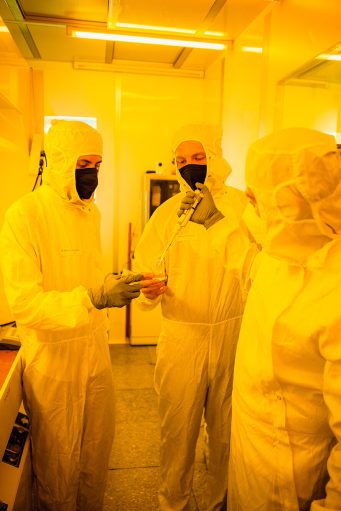
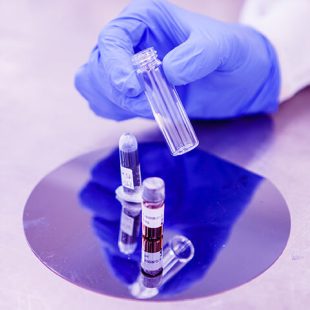
Get rid of emissions, power the world, save lives or explore materials with particles. Become the new Oppenheimer with a happy ending.
- You will gain a good understanding of mathematics, general and nuclear physics, electrical engineering and materials. In addition, you will learn the basics of computer science.
- You will learn all about the physical processes that take place in different materials, as well as how to measure and diagnose them. You’ll know all about the safe design, operation and decommissioning of nuclear facilities. You will know the laws of particle propagation through the environment and
apply this in research or medical facilities.
- A bright future awaits you in nuclear energy. Nuclear is an important part of the energy mix in Slovakia and Europe and has its place in the future because we consider it to be green energy. You can build, manage and decommission power plants, treat nuclear waste and its decontamination or manage projects in this field.
- You can also apply your acquired knowledge in the field of materials in research or
in industry as well as in nuclear medicine or radiation protection. - Once you’ve completed your bachelor’s degree, you’ve also paved the way to an engineering degree.
We enjoy everything we see come to life. From tiny drones to autonomous cars to huge transport systems that run cities. Are you one of us?
- Design, construct, program and control a variety of robotic systems, industrial robots and manipulators. You will not only be programming robots, but you will also work with sensors to teach robots how to sense their environment. You will not only teach yourself, but also artificial intelligence, which cannot be lacking in modern robotics. In addition to theoretical knowledge, you will also have the opportunity to gain practical experience through exercises at the National Robotics Centre and in state-of-the-art laboratories.
- You will find applications in the deployment, operation and programming of automation and informatics systems in a variety of fields – mainly manufacturing industry, but also services, transport and energy infrastructure, administration, ecology, healthcare, intelligent buildings, homes, science and research or mobile applications. You can also cheerfully go on to an engineering degree.
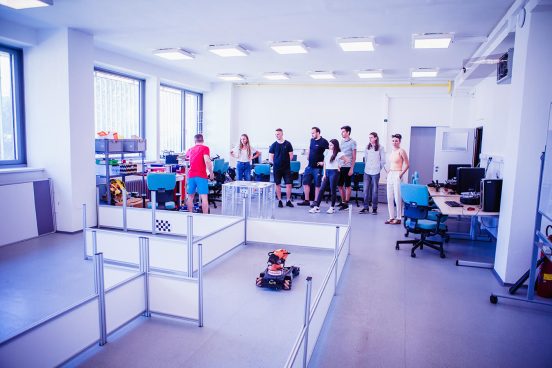
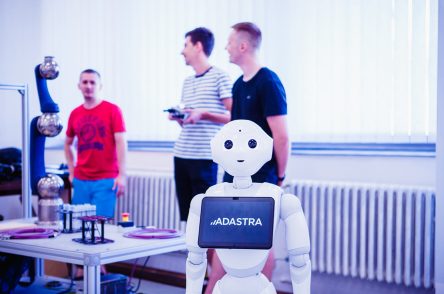
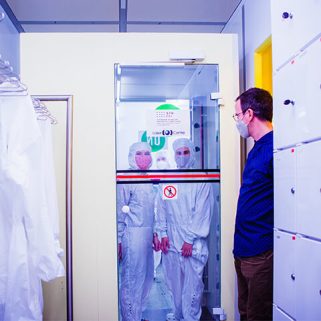
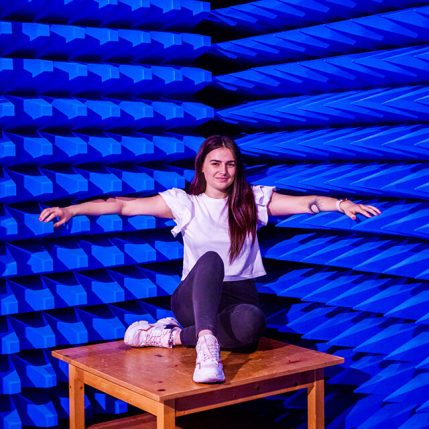
You can’t put anything cooler on your resume. After your bachelor’s degree in any of our disciplines, you can study aerospace engineering at the engineering level. Operate a Mars rover, study black holes and unlock the secrets of the world’s very existence. The answer is 42.
- This programme is only at engineering level, so you’ll already bring a lot of practical knowledge from your undergraduate studies.
- But in addition, you’ll work on engineering technologies used primarily in high-performance space and aerospace systems and applications. We’re talking about advanced electronic, sensor, robotic and propulsion systems. You’ll use the latest technologies and artificial intelligence in their design.
- You will gain knowledge of astrophysics, astrodynamics, astrobiology as well as the mechanics and thermodynamics of space systems – you will understand the Universe and be able to explore it further.
- Constructor, designer and developer of space technology systems or microsatellites. You can create new software, products, components or entire companies that will help us discover or eventually populate space.
- If you want to stay on Earth, you can also work in advanced electronic systems, but also in robotics, mechatronics, IT, transport and energy. You also have a wide-open path in science and research.
Enter a world of endless digital possibilities with our interdisciplinary degree programme! It’s the way to become an architect of the future and a leader in digitalisation.
- You’ll learn how to integrate knowledge from computer science and cybernetics to solve the real challenges of the digital era.
- With an emphasis on practical skills in programming, network technology, automation and control, our graduates will have the ability to link all of these areas into high-tech solutions.
- So this study programme is not just about acquiring knowledge – it is a journey to transform thinking.
- You will be proficient in the analysis, design and implementation of sophisticated software systems.
- You will also understand hardware, the principles of technical systems and the basics of programming.
- You’ll have access to the latest technologies and digital transformation concepts such as Industry 4.0 and 5.0.
- Knowledge of software and hardware will allow you to get to the heart of the technology and open the way to innovation.

